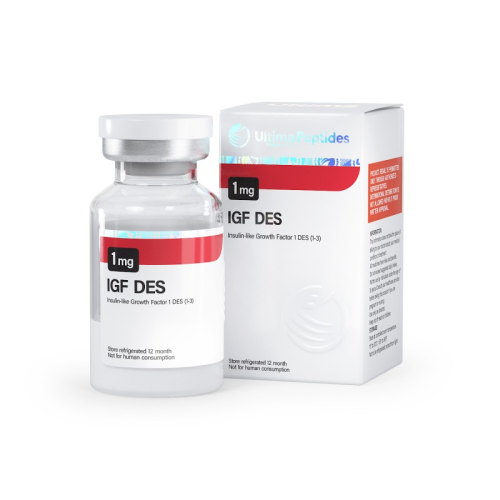Ultima-IGF DES 1mg
- Brand: Ultima Pharmaceuticals - US
- Product Code: Ultima-IGF DES 1mg
- Availability: In Stock
-
$71.00
CLASSIFICATION
Peptide Hormone
ACNE
No
WATER RETENTION
No
HBR
No
HEPATOTOXICITY
No
AROMATIZATION
No
MANUFACTURER
Ultima Pharmaceuticals - US
WAREHOUSE
USA Warehouse 5
SUBSTANCE
IGF-1 DES
,
Products are shipped without branding labels for security purposes.
Insulin-like Growth Factor 1 (IGF-1), also referred to as Somatomedin C, is a hormone structurally similar to insulin, playing a crucial role in growth during childhood and having anabolic effects in adults.
IGF-1 is one of the many growth factors essential for normal human development. It is primarily produced in the liver but is also synthesized in various tissues throughout the body.
IGF-1 is composed of 70 amino acids, featuring an A and B chain linked by disulfide bonds, with a C peptide region containing 12 amino acids.
UsageInsulin-like Growth Factor 1 (IGF-1) supports normal bone and tissue growth and development, and it also has the capability to lower blood glucose levels. It targets fat cells to promote fat utilization, thereby increasing lean body mass while reducing fat. These effects are particularly sought after by athletes and bodybuilders. Elevated IGF-1 levels are associated with weight gain, which results from an increase in lean body mass rather than fat accumulation.
IGF-1 is popular in the bodybuilding community and among regular exercisers, as it aids in faster recovery after workouts and enhances energy levels during exercise.
IGF-1 injections are commonly administered to both adults and children with growth hormone deficiencies. It includes many vital amino acids that assist children who may be experiencing slow growth and support adults with deficiencies.
Research indicates that IGF-1's anabolic effects might stem from reduced protein breakdown and increased protein synthesis in skeletal muscle, possibly owing to its direct action on muscle tissue, thereby aiding in the healing of skin burns and other tissue irregularities.
Mechanism of ActionIGF-1 is a naturally occurring hormone in human blood, primarily regulating the impacts of growth hormone within the body. Normal functions of IGF-1 and growth hormone include promoting tissue and bone growth. IGF-1 is produced in various tissues in response to growth hormone present in the bloodstream.
IGF-1 fosters growth throughout the body, stimulating growth in nearly every cell type, particularly those in bones, cartilage, skeletal muscles, the liver, kidneys, nerves, skin, and lungs. Beyond its insulin-like properties, IGF-1 also aids in managing cellular DNA synthesis.
AdministrationIGF-1 is administered via subcutaneous injection into a fleshy part of the body, such as the stomach or abdominal area. It can also be given intramuscularly.
Mode of Administration:Before giving IGF-1, ensure that a clean and sterile syringe is used.
For lean muscle growth and fat loss:
Dosage Amount:IGF-1 should not be injected more than twice a day.
A typical IGF-1 dosage cycle lasts between 2 and 12 weeks.
Children and adults prescribed IGF-1 for growth deficiencies should consult their healthcare provider for appropriate dosing.
Side EffectsThe side effects of IGF-1 may resemble those of other growth hormones, including excessive tissue growth (acromegaly) and potential damage to the joints, liver, and heart. Possible side effects include joint pain, muscle discomfort, headaches, and nausea. IGF-1 may lower blood glucose levels, leading to hypoglycemia. Additionally, research has linked IGF-1 to a heightened risk of certain cancers, including lung, breast, colorectal, and prostate cancers.
Benefits
